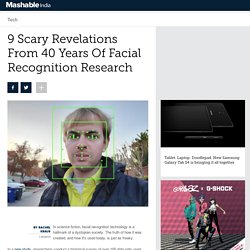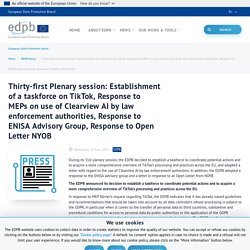

You Can Fight Facial Recognition. How to opt out of tech that invades… How to opt out of tech that invades your privacy Too often, facial recognition feels like a mysterious, society-pervading technology that is too complex for individuals to understand or combat.

We read about scary new applications of the tech and its increasingly concerning role in determining who gets a job, who gets a loan, or even who gets arrested. Cookie Policy. Clearview, Cameras, and Karen: Newly Released Documents Expose Facial Recognition Technologies Used Across Massachusetts — The Data for Justice Project. Reclaim Your Face - Reclaim Your Face.
Judge denies motion to dismiss facial recognition suits against Amazon, Microsoft. 9 Scary Revelations From 40 Years Of Facial Recognition Research. In science fiction, facial recognition technology is a hallmark of a dystopian society.

The truth of how it was created, and how it's used today, is just as freaky. In a new study, researchers conduct a historical survey of over 100 data sets used to train facial recognition systems compiled over the last 43 years. The broadest revelation is that, as the need for more data (i.e. photos) increased, researchers stopped bothering to ask for the consent of the people in the photos they used as data. Researchers Deborah Raji of Mozilla and Genevieve Fried of AI Now published the study on Cornell University's free distribution service, arXiv.org. New AI Tool 'Deep Nostalgia' Brings Old Photos To Life In Creepy Video Portraits. How eerie were the moving Hogwarts portraits in the Harry Potter film series?

They featured subjects who have passed away but are able to move with lifelike precision. What if I told you an AI tool can achieve the same effect, at least to some extent? Now that I have your attention, a new AI technology is bringing old pictures to life. The tool, called Deep Nostalgia is breathing life into photos of historcial figures like US President Abraham Lincoln, Indian freedom fighter Bhagan Singh mong others.
This technology can do the same for pretty much any old picture and it's pretty creepy. Deep Nostalgia is an AI tool from MyHeritage with a photo animation feature that creates short video portaits from old images. Thirty-first Plenary session: Establishment of a taskforce on TikTok, Response to MEPs on use of Clearview AI by law enforcement authorities, Response to ENISA Advisory Group, Response to Open Letter NYOB. During its 31st plenary session, the EDPB decided to establish a taskforce to coordinate potential actions and to acquire a more comprehensive overview of TikTok’s processing and practices across the EU, and adopted a letter with regard to the use of Clearview AI by law enforcement authorities.

In addition, the EDPB adopted a response to the ENISA advisory group and a letter in response to an Open Letter from NOYB. The EDPB announced its decision to establish a taskforce to coordinate potential actions and to acquire a more comprehensive overview of TikTok’s processing and practices across the EU. Facebook Scraped 1 Billion Pictures From Instagram to Train Its A.I. — But Spared European Users. General Intelligence The team purposely excluded Instagram images from the European Union, likely because of GDPR OneZero’s General Intelligence is a roundup of the most important artificial intelligence and facial recognition news of the week.

Facebook researchers announced a breakthrough yesterday: They have trained a “self-supervised” algorithm using 1 billion Instagram images, proving that the algorithm doesn’t need human-labeled images to learn to accurately recognize objects. A patent shows how surveillance drones could ID you from above. Youtube.
FR USE BY LAW ENFORCEMENT. CONVENTION 108. COUNCIL OF EUROPE. CLEARVIEW-AI. WRONGFULLU ACCUSED. FACIAL RECOGNITION TECHNOLOGIES. Facial Recognition. Facial recognition. Facial Recognition. Everalbum, Inc: In first facial recognition misuse settlement, FTC requires destruction of algorithms trained on deceptively obtained photos - Harvard Journal of Law & Technology. This is how we lost control of our faces. Do These A.I.-Created Fake People Look Real to You? There are now businesses that sell fake people.

9 scary revelations from 40 years of facial recognition research. Reclaim Your Face - Reclaim Your Face. European Union Agency for Fundamental Rights. Facial Recognition and Coded Bias: Online Conversation With EFF's Associate Director of Community Organizing and the Coded Bias Team. On Wednesday, January 27, EFF Associate Director of Community Organizing, Nathan 'nash' Sheard (he/ze), will take part in a live Q&A on Twitter with the team behind Coded Bias, a revelatory documentary that exposes the ways that AI systems have developed algorithms that can infringe on our privacy and threaten civil rights.

Follow along on Twitter @EFF and @CodedBias to learn more about EFF's views on algorithmic bias, facial recognition, and how we can find the best path forward to protect digital rights. Join and follow the conversation using the #CodedBias hashtag. Have questions? Let us know on Twitter by replying to the conversation, or tweeting at us with #CodedBias in your message!
About Coded Bias: Hamburg DPA Deems Clearview AI’s Biometric Photo database Illegal, Orders a Partial Deletion of Biometric Profile. AI artificial intelligence biometrics Clearview facial recognition Hamburg DPA Deems Clearview AI’s Biometric Photo database Illegal, Orders a Partial Deletion of Biometric Profile Yesterday, the Hamburg Data Protection Authority decided that Clearview AI’s searchable database of biometric profiles was illegal under the EU’s GDPR and ordered the U.S. company to delete the claimant’s biometric profile.

Clearview AI scrapes photos from websites to create a searchable database of biometric profiles. This database, which is sold to private companies and U.S. law enforcement, has over 3 billion images gathered from websites and social media. The claimant submitted a complaint to the Hamburg DPA after discovering that Clearview AI had added his biometric profile to the searchable database without his knowledge or consent. POLITICO AI: Decoded: AI in the UK — A Faustian bargain with China — EU Commission urged to ban AI tech. Press play to listen to this article How global thinking on AI is shaping the world, from Berlin, Brussels, London and beyond.

By MELISSA HEIKKILÄ Send tips, feedback and anecdotes | @MelissaHei | Subscribe for free. Onezero.medium. OneZero’s review of NIST’s live facial recognition vendors reveals that the companies that sell facial recognition to governments across the world, as well as private spaces like retailers and malls, are often names most Americans have never heard of — small enterprise software companies that don’t sell products to consumers and don’t market themselves outside of trade shows or direct pitches to potential clients.

These are companies like Palo Alto-based Camvi, India’s Awiros, and Los Angeles’ Trueface, which often illustrate their technology with images of crowds of people being identified while walking down the street or attending a sporting event. Each of those companies has fewer than 50 employees, according to LinkedIn data. Another company based in Tokyo, Ayonix, claims that each of its cameras can analyze between 30 and 1,000 faces in a video stream every second. “This looks like an egregious violation of people’s privacy,” ACLU attorney Jacob Snow told NBC News.
Facial-recognition moratorium back on EU agenda. The European Parliament's committee on civil liberties backed on Thursday (2 July) a moratorium on facial recognition for law-enforcement purposes - following the EU data watchdog earlier this week, which backed a ban on this technology in public spaces. "Legislation is never perfect, but this is the right step in the right direction," said socialist MEP Tudor Ciuhodaru, who is the rapporteur on artificial intelligence in criminal law, and its use by the police and judicial authorities.
In his report, Ciuhodaru warned the risks linked to AI-technologies are aggravated in law enforcement as they might undermine the presumption of innocence, liberty, security, effective remedy or fair trial rights of individuals. "The current state-of-play of these technologies, and the significant impacts on fundamental rights, call for an in-depth and open societal debate to consider the justification for their deployment," he warned. EDPS’ call for a moratorium on Facial Recognition in public places - MIAI. On 1st of July, the European Data Protection Supervisor, Wojciech Wiewiórowski, called for a moratorium on facial recognition in public places. The current European Data Protection Supervisor (EDPS), Wojciech Wiewiórowski, is the European Union’s independent data protection authority, which is responsible for overseeing data protection compliance by EU institutions and agencies.
This warning call from the EDPS came shortly after the public consultation conducted by the European Commission on the White Paper on Artificial intelligence. In this framework the European Commission is currently examining feedbacks submitted by more than 1,200 participants. In this regard, the European Commission’s Vice-President for Digital policy, Margrethe Vestager stressed that the participants expressed their fear for their rights in case of inappropriate use of AI. French Court Said NO To Facial Recognition Technology. Vers un encadrement de la reconnaissance faciale en Europe. Reconnaissance faciale : une réglementation stricte est nécessaire pour empêcher les violations des droits de l’homme - Actualités 2020 - 2021. The Council of Europe has called for strict rules to avoid the significant risks to privacy and data protection posed by the increasing use of facial recognition technologies.
Furthermore, certain applications of facial recognition should be banned altogether to avoid discrimination. In a new set of guidelines addressed to governments, legislators and businesses, the 47-state human rights organisation proposes that the use of facial recognition for the sole purpose of determining a person’s skin colour, religious or other belief, sex, racial or ethnic origin, age, health or social status should be prohibited.
This ban should also be applied to “affect recognition” technologies – which can identify emotions and be used to detect personality traits, inner feelings, mental health condition or workers´ level of engagement – since they pose important risks in fields such as employment, access to insurance and education. “But this can be stopped. La vérité sur les failles de la biométrie faciale. Souriez, vous êtes identifiés ! La reconnaissance faciale, un filon et un danger ? Cet hiver, il y a le virus et le froid : les visages sont emmitouflés derrière les masques et les écharpes. Reconnaissance faciale et interdiction commerciale de stade : la CNIL adresse un avertissement à un club sportif.
À la suite de signalements concernant la mise en œuvre par un club sportif d’un dispositif de reconnaissance faciale des spectateurs, la Présidente de la CNIL a décidé de faire procéder à des contrôles sur l’usage de cette technologie. Des lignes directrices en matière de reconnaissance faciale. Publié le 02/03/2021 par Etienne Wery - 0 vues Le Conseil de l’Europe adopte des lignes directrices en matière de reconnaissance faciale. Les Etats signataires de la Convention 108 doivent en tenir compte dans les textes qu’ils adoptent. Certaines utilisations sont proscrites. Le secteur privé n’est pas gâté. La Convention 108 du Conseil de l’Europe On l’oublie parfois, mais la directive de 1995 sur la protection des données personnelles n’est pas le texte fondateur de la matière.
Le Conseil de l’Europe (que l’on ne confondra pas avec l’Union européenne) avait en effet adopté, dès 1981, une Convention n° 108 pour la protection des données à caractère personnel (STE N°108).